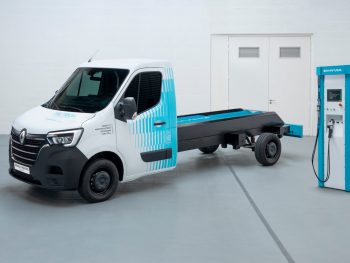Hyvia previews two more hydrogen commercial vehicles, due 2022
Hyvia, a joint venture between Renault and Plug Power, has revealed two further hydrogen light commercial vehicle prototypes ahead of their 2022 launch.
Following the Renault Master Van H2-Tech debut last month, the two new vehicles are again based on the Renault Master fitted with a 30kW fuel cell. They also offer zero CO2 emissions, along with the increased range and quick refuel times associated with hydrogen fuel cell electric vehicles.
The first, revealed at the Solutrans show held at Eurexpo Lyon, France, is the Master Chassis Cab H2-Tech, while the second is the Master City Bus H2-Tech, presented for the first time at the Salon des Maires in Paris.
The chassis cab variant delivers a range of 155 miles with many conversion options including a box van with 19m3 of space and up to 1,000kg in payload. Meanwhile, the city bus can carry up to 15 passengers with a range of 186 miles.
Both vehicles will be available in production form in 2022, supported by green hydrogen production and distribution solutions. In 2022, Hyvia will deploy its full hydrogen ecosystem of hydrogen fuel cell commercial vehicles, as well as its refuelling stations.
David Holserbach, Hyvia CEO, said: “Hyvia is moving fast. After less than six months of existence, we unveiled three hydrogen light commercial vehicles: a van, a chassis cab and a city bus, to meet different usages, for professional fleets or territories. We also revealed our hydrogen refuelling station, to offer customer refuelling options where hydrogen infrastructure is still in development. Hyvia is about concrete solutions to be on track to meet the challenges of green hydrogen mobility and decarbonisation of transport.”
The Hyvia H2-Tech vehicles and technology are all made in France. The Renault Master is produced at the Batilly plant, while the electric and hydrogen integration is completed by PVI, a Renault Group subsidiary based in Gretz-Armainvilliers.
The electric motor is produced at Renault’s Cleon plant, while the fuel cell assembly and hydrogen refuelling station will initially start at the Flins plant.








